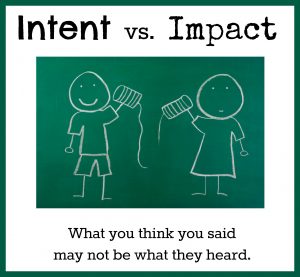Intent vs. Impact
One of my most stressful jobs as a husband and father is the occasional and obligatory weekend visits to our extended families. What makes family visits (on both sides) stressful is not the responsibility of having to pack for my family or coordinating everyone to move out of the house and into the car. No, I got this down to a science. What makes it stressful is having to be present with family whose values are diametrically opposed to my own family’s values and worst yet, our existence. It’s not that their underlying beliefs support long-held systems of oppression (which is undoubtedly contemptible), it’s that they embrace these beliefs with a sense of defiance and superiority. They are unaware of how their values affect us (same-sex, multi-ethnic couple with a socially conscious feminist daughter). Honestly, they don’t seem to care about it.
This discord makes visits with them a dreadful experience, which dampens my mood a week before the visit. It’s not enough that I find myself always on heightened alert (activated amygdala?) that only a healthy level of disassociation can cure, but there is nowhere I can go to find a sense of safety. On top of this, I find myself carefully assessing each social interaction in preparation in case I need to steer any potential political conversations quickly. I have a collection of benign topics that can be conjured in case the conversation reaches code yellow.
All of this is exhausting, but it must be done for my own mental health. I’m usually good at managing it, but once in a while, I am too late to stop an offensive comment from being made. This past weekend, as we were all hanging out in the main family room, I overheard a family member casually use the word “oriental” to describe people with an Asian identity (as if the descriptor was necessary in the first place). At that moment, my eyes instinctively widened as I tried to think of something to say. I went over every possible response, including; correct him, say nothing, change the subject, or provide a history and geography lecture. Luckily, I didn’t have to make a decision, thanks to my socially conscious husband, who, with calmness and sureness, chose a double routed response. He first corrected him by saying that the preferred and more accurate term is Asian. My eyes relaxed a little. His simple correction could have been “enough,” given the circumstances, however – and this is where the sense of defiance and superiority comes in – he responded by saying with a hint of annoyance, “what’s the difference?” Eyes widened again. This is when my husband chose the second route of providing a history and geography lesson. Our family member then made another unnecessary comment. Eyes rolling.
It was just irritating to hear his “what’s the difference” response because, in this day in age, he should know better. This ignorance speaks to his privilege as a White person who doesn’t have to know the difference. There is no excuse for not knowing something as familiar as this, especially for someone who claims to be “better” at understanding true diversity. Anyways, what moved me from irritation to just pure anger was his response after the history and geography lesson.
But, before I share this, I want to take a step back and provide some context to my anger. I am usually very tolerant of people’s ignorance, especially when they are sincere in their mistakes and make an effort to correct their language or behaviors. I can appreciate this, since I am human too, and I have had my share of “oops” moments. Heck, I still struggle to undo 40 years of using the gender identifying “Latina/o” in favor of the more gender-neutral Latinx. I occasionally slip up; however, I am mindful of correcting my misstep. It’s frustrating when a person, especially someone with a privileged identity, shows a disregard for their misstep and seems inconvenienced by having to modify anything to accommodate “others.” How dare we!
So what did he say? Alright, I will not delay this, he said, “well, no offense intended.”
Okay, I know you may be thinking that this is an innocuous response and that I am being too sensitive and blowing this out of proportion. However, there is a lot of background information that only a person who has a history with him would understand. Let’s say that I wouldn’t be surprised if he uses Oriental again. Plus, it wasn’t just what he said, but how he said it. You know what I mean; that subtle insincerity in their comment that is intended to “make it all better” when, in fact, exacerbates it. It’s the response someone gives after you tell them that what they did hurt you…” Well, I’m sorry you feel that way.” Yes, this one!
It’s not necessary or even a good idea to ever respond with a defense of your motivation. It really doesn’t matter. The language or behavior has an undeniable impact, regardless of intention. Would you defend your motivation if you accidentally break a friend’s possession? “Well, I didn’t intend to bump into your favorite vase, causing it to smash into little pieces.” This comment would do very little to comfort your friend, so don’t even think about it. The best response in this situation would be a sincere apology, followed by an offer to correct the situation (perhaps the vase could be repaired or replaced?). This response is sensible and more compassionate.
At this point, I do not expect much from some of my relatives. It would have been better if he had embraced the correction as a valuable contribution to his ongoing development as a human being. He could have just apologized for the misstep, gave thanks for the correction, and make a sincere and conscious effort to change. But, for this to happen, one must move beyond self-interest and into the broader social-interest.
